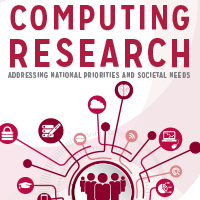 CCC Chair Beth Mynatt has contributed to this blog.
CCC Chair Beth Mynatt has contributed to this blog.
As computing has grown even more essential to day to day life, the capacity of computing research to effect societal change and address the needs of society has subsequently increased. In convening the Computing Research Symposium, our goal was to grow awareness and enthusiasm for the role that computing research plays in addressing timely and critical societal needs. How can we use artificial intelligence to amplify human abilities? How can intelligent infrastructure strengthen our communities? How do security and privacy promote democracy? How can big data and algorithms ensure fairness?
To help answer these questions and more, we held the second Computing Community Consortium (CCC) Symposium on Computing Research: Addressing National Priorities and Societal Needs on October 23-24, 2017.
The meeting brought together 190 in-person participants and over 600 online viewers to raise the visibility of work that connects innovative computing research to major societal needs. The five panels, three plenaries, and an early career poster session presented numerous ideas that could shape our future world. Farnam Jahanian, from Carnegie Mellon University, encouraged the audience to seize the moment. The future is here, and it is the enabler of new applications and services.
Here are just a few examples:
- Plenary speaker Michael Dunaway, from the University of Louisiana at Lafayette, explained that hurricane tracks have been very accurate this year because computational models have gotten very good at predicting the direction of the hurricane at the upper atmosphere level. As a result of better predictions, officials decided not to evacuate the city of New Orleans for Hurricane Nate on October 4th because they could trust the predicted track of the storm. This ended up saving the city millions of dollars in unnecessary spending on an unneeded evacuation. Panelists Chandra Krintz and Elizabeth Belding, both from UCSB, argued for new approaches to networking and wireless communication to create new economic opportunities in rural agriculture.
- CCC Vice Chair Mark Hill, asked the AI and Amplifying Human Abilities panel about AI and its impact on U.S. jobs during the Q&A. The panelists argued that AI will make jobs more interesting and lead to more diverse, higher skilled and therefore higher paid jobs. Plenary speaker Thad Starner, from Georgia Tech, explained that as we amplify people + computing systems we create more potential for job growth. Panelist Suchi Saria, from Johns Hopkins, posed new goals for machine learning approaches that can better integrate with human decision-making.
- The Security and Privacy for Democracy panelists were asked about the tradeoff between security and ethical practices. When an issue in security is discovered, do they as researchers wait for it to get fixed before exposing it to the public? Dan Wallach, from Rice University, explained that there is a confidential disclosure. He lets the company know about the issue and gives them time to fix it before publishing his findings and exposing the issue to the public. Roger Dingledine, from the Tor Project, pointed to the use of secure servers by the media to receive confidential tips from the public, while Phillipa Gil, from UMass Amherst, discussed how to combat censorship on the public Internet.
- Panelist Solon Barocas, from Cornell University, explained why algorithms are often not “fair” due to biases and gaps in underlying data while panelist Kelly Jim, from Laura & John Arnold Foundation, argued for new approaches in exploring data to address major societal concerns.
The final symposium panel on Connecting Computing Research with National Priorities included representatives from government and foundations and discussed ways to expand the impact and influence of basic computing research in shaping our society.
- Patti Brennan, director of the National Library of Medicine (NLM), encouraged computing researcher to bring their expertise to help address challenges in health ranging from fostering healthy behaviors to addressing a growing crisis in mental health. The panelists were asked if they thought that computational researchers should be in all fields. Their argument was that if we put computation in all areas then we run the risk of losing the impact. Jim Kurose, from the National Science Foundation, mentioned the CS+X programs, which a number of universities have developed, as an example of that marriage trying to reach out to a different set of students.
The 190 people in attendance included 47 early career researchers who shared their research in a poster session and over 30 attendees from federal agencies such as National Science Foundation, National Institute of Standards of Technology, The Networking and Information Technology Research and Development (NITRD) Program, National Institutes of Health, U.S. Census Bureau, Defense Advanced Research Projects Agency, and the U.S. Department of Agriculture.
In addition to slides and videos from the symposium presenters, CCC white papers on the symposium topic of intelligent infrastructure are available here. Videos from the poster presenters are available here. Future blogs about each panel will be posted in the upcoming weeks. We hope that you not only enjoy and learn from the symposium resources but also find new perspectives on how your research may contribute to our collective future.” We hope that you not only enjoy and learn from the symposium resources but also find new perspectives on how your research may contribute to our collective future.










Trackbacks /
Pingbacks